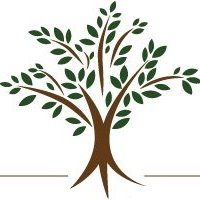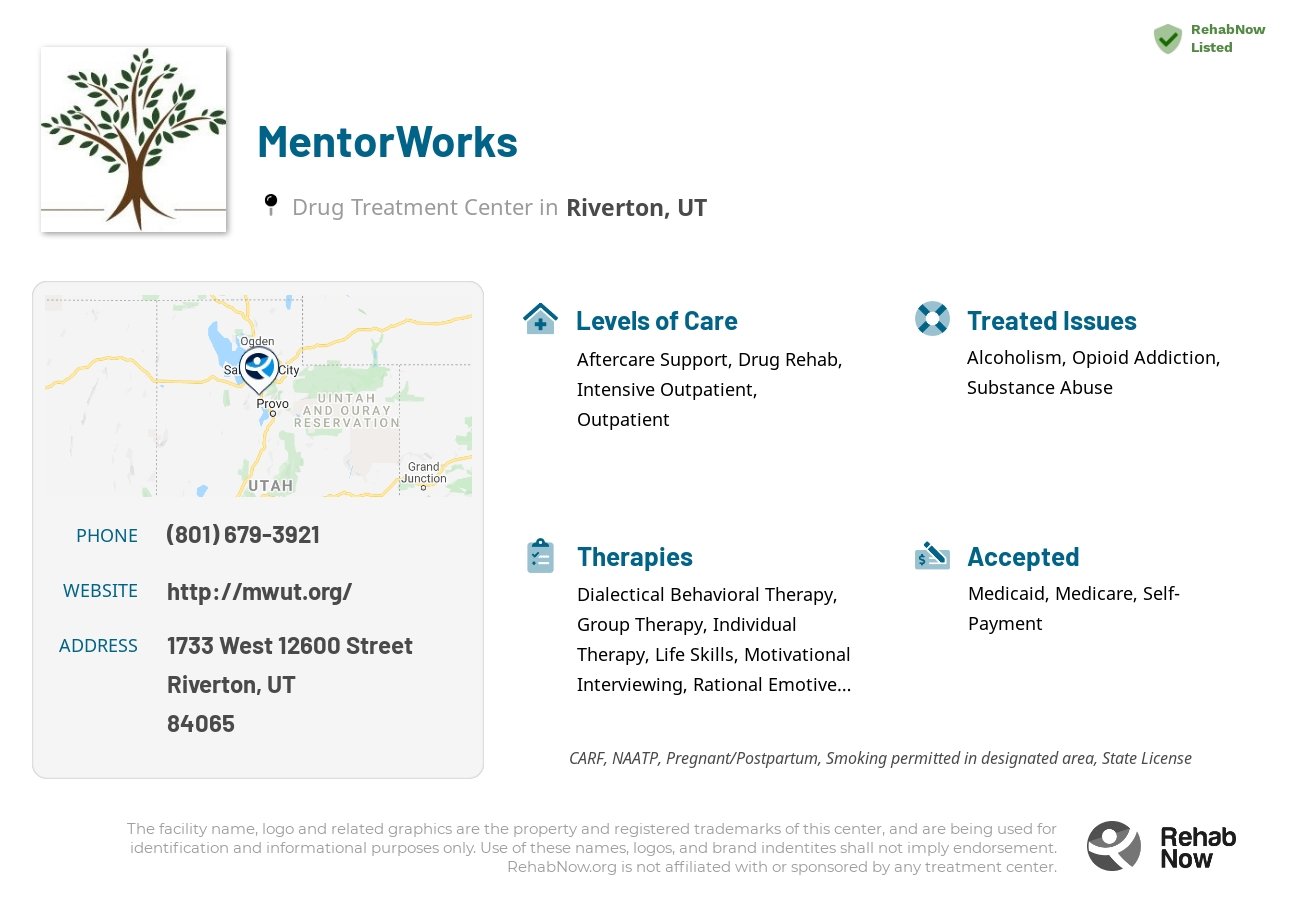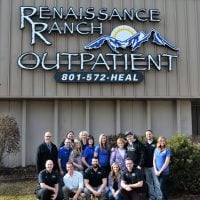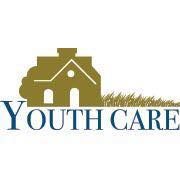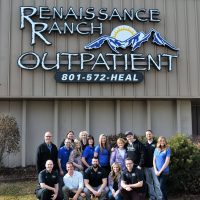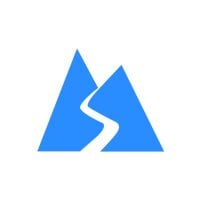MentorWorks
Drug Rehab Center in Riverton, Utah
MentorWorks offers specialized care for substance and alcohol abuse, including Dialectical Behavioral Therapy (DBT), Group Therapy, Individual Therapy, Life Skills, Motivational Interviewing, and Rational Emotive Behavior Therapy (REBT) with multiple levels of care that are tailored to the individual needs of their patients.
About MentorWorks in Utah
MentorWorks, located in Riverton, UT, provides specialized treatment for alcohol abuse, opioid addiction, substance abuse, and drug addiction. Under their care, patients are provided with a variety of therapeutic methods and treatments in order to best serve their individual needs. These include Dialectical Behavioral Therapy (DBT), Group Therapy, Individual Therapy, Life Skills, Motivational Interviewing, and Rational Emotive Behavior Therapy (REBT). MentorWorks is committed to helping their patients on their journey to a successful recovery through their quality and compassionate care.
At MentorWorks, individuals are able to access several levels of care depending on their circumstances. Aftercare Support, Drug Rehab, Intensive Outpatient, and Outpatient treatment are all available. All of their services are adapted to the specific needs of each individual, ensuring that they are able to receive the best possible care and attention. MentorWorks strives to provide a safe and welcoming environment where their patients can feel empowered to reach their goals and regain their sobriety.
Genders
Ages
Modality
Additional
Conditions and Issues Treated
Substance Abuse Treatment is important when getting sober, as it helps addicts learn the skills they need to live a clean life. There are many different kinds of recovery treatment, including but not limited to medication-assisted therapy, behavioral therapeutic approaches, self-help groups, and counseling. Each treatment has its benefits that help addicts recover.
Counseling can help addicts learn the skills they need to live sober lives. It can be used to treat underlying mental health issues, like depression or anxiety, that could lead to relapse. Counseling can also help people find work, deal with family problems, and learn to manage living without drugs.
With so many people addicted to opioids, we need to help those who want to quit. The cycle begins when opioid addicts take opioids for a painful injury. When someone starts taking their medication differently or in excess, it means they’re addicted and at risk of overdosing.
In , detoxing from these types of treatments is the most effective way to beat this. Most facilities begin with medical assistance and then provide counseling services; rehabilitation follows after successful treatment.
Levels of Care Offered
This center offers a variety of custom treatment tailored to individual recovery. Currently available are Aftercare Support, Drug Rehab, Intensive Outpatient, Outpatient, with additional therapies available as listed below.
An intensive outpatient program (IOP) is effective for drug rehab, but it can take six months to several years to complete. It’s the most popular type of drug rehab program in the United States. One example of a successful IOP success story is actor and comedian Chris Rock, sober since 1990.
An IOP allows participants to spend nights at home while attending meetings throughout the day. It’s a good way for drug addicts to make a recovery plan in an outpatient setting while still supporting their loved ones.
Alcohol or drug addiction, or co-occurring disorders, are treated in an outpatient program. The patient must attend therapy and other programs at the facility but can return home each night.
Outpatient treatment allows recovering addicts to live at home while receiving addiction treatment. Outpatients can attend group sessions for a few hours per week. Outpatients may also continue to work full time and study/attend school without interruption if they choose.
The accomplishment of completing a drug or alcohol treatment program is just the first step. Once that is complete, aftercare support comes into play. This includes helping people adjust to life without substances outside of guidelines with assistance like getting sober living accommodations and career counseling and AA/NA programs for those who are struggling between sobriety or want continued help in maintaining it once they have completed their initial rehabilitation at an addiction facility.
Aftercare comprises services that help recovering addicts readjust to normal day-to-day activities while working on specific issues. These problems include psychiatric issues, family problems caused by substance abuse, continuing education pursuits if desired during rehab, etc. These can last up to one year+ depending on what’s needed most urgently upon completion of earlier stages.
Therapies & Programs
Different people react differently to various treatment options. Some drug rehabilitation centers offer individualized treatment that caters to the specific needs of a drug addict. The best treatment option varies on an individual depending on the type of drug abused, life history, medical condition of the person, social circumstances, and the environment they live in now.
When a person enters drug rehab, they usually have anti-drug associations such as withdrawal symptoms, stress, cravings, etc. The first step of drug rehab is to detoxify the body from any residual substances in it. Drug rehabilitation centers usually employ trained medical professionals to help in this process. Usually, the initial detoxification lasts for five days, where the person is monitored under close supervision.
Attending group therapy at MentorWorks in , is a useful way for those seeking sobriety to realize they aren’t the only one going through it.
This is when a group of people on different recovery phases get together and talk about what they’re going through, their triggers, successes, and failures. This can include alternative types of therapies too! Group therapy may occur on an outpatient or inpatient basis with groups that have no pre-existing relationships outside the session, unlike support groups where everyone already knows each other beforehand.
This type of cognitive-behavioral therapy helps people understand how their thoughts, behaviors, and feelings are interconnected. It can help patients with borderline personality disorder gain control over their actions and stop self-harming thoughts and attempts.
The use of Rational Emotional Behavior Therapy for addicts has been shown to have positive and desirable outcomes. It is a form of specific counseling that replaces negative and self-limiting thoughts with positive and productive behaviors. Self-defeating thoughts and habits can limit your possible successes. Some examples of this are procrastination, unhealthy eating, and angry outbursts. You may not be aware that some unhealthy behaviors and thoughts are sabotaging your potential accomplishments.
Life Skills Services offered at Drug Treatment Centers assists addicts in their recovery by teaching them healthy coping mechanisms that will aid them in becoming sober, focussing on helping people enter into, and maintaining long-term sobriety. Drug Treatment Centers provide Life Skills Services at varying levels of intensity, specific to the needs and requirements of each patient.
Life Skills Services offered at Drug Treatment Centers assists addicts in their recovery by teaching them healthy coping mechanisms that will aid them in becoming sober, focussing on helping people enter into, and maintaining long-term sobriety. MentorWorks in Riverton, Utah provide Life Skills Services at varying levels of intensity, specific to the needs and requirements of each patient.The benefits of Life Skills Services offered at Drug Treatment Centers:
- Restores hope and empowerment — Helps addicts believe that recovery is possible and instills a new confidence in their ability to achieve a positive, drug-free future
- Enhances family involvement — Encourages families to get involved in the recovery process and supports their understanding and encouragement of healthy behavior.
- Increases patient’s compliance — Helps patients take responsibility for and ownership of their recovery and encourages continued progress
- Reduces relapse rates — Encourages long-term abstinence and emphasizes the importance of establishing sober support systems.
Payment Options Accepted
For specific insurance or payment methods please contact us.
Additional Details
Specifics, location, and helpful extra information.
Riverton, Utah 84065 Phone Number(801) 679-3921 Meta DetailsUpdated November 25, 2023
Staff Verified
MentorWorks Patient Reviews
There are no reviews yet. Be the first one to write one.
Riverton, Utah Addiction Information
More than 500 people in Utah die each year from the effects of drug abuse and/or addiction. Substance abuse rates in Utah have seen an upward trend for a variety of drugs. Opioids are involved in almost 70% of all drug-related deaths in the state, annually. In 2014, Utah officials created a Good Samaritan Law to protect drug users who report possible overdoses from being prosecuted themselves.
The drug addiction problem in Riverton, Utah, is not as bad as in other parts of the country. However, there is still a significant problem with drug addiction. Some of the most common drugs abused in Riverton include alcohol, marijuana, methamphetamine, and opioids. The treatment process in Riverton will depend on the person's needs. Most treatment programs will begin with assessing the individual's addiction and any co-occurring mental health issues.
Treatment in Nearby Cities
- Syracuse, UT (39.9 mi.)
- Escalante, UT (191.1 mi.)
- Brigham City, UT (68.5 mi.)
- Alpine, UT (9.7 mi.)
- Providence, UT (82.2 mi.)
Centers near MentorWorks
The facility name, logo and brand are the property and registered trademarks of MentorWorks, and are being used for identification and informational purposes only. Use of these names, logos and brands shall not imply endorsement. RehabNow.org is not affiliated with or sponsored by MentorWorks.
